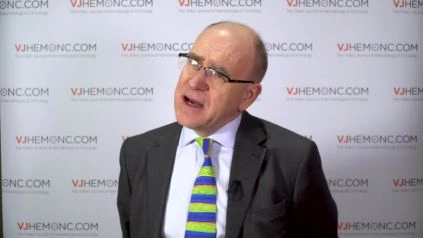Relapse remains the main obstacle for patients with acute myeloid leukemia (AML) and myelodysplastic syndromes (MDS) after allogeneic stem cell transplantation and novel therapeutic strategies are urgently required. Now, researchers are pioneering the concept of delivering pharmacological agents, such as azacitadine, post-transplant to reduce the risk of relapse. However, better delivery methods are needed. Speaking from the American Society of Hematology (ASH) 2017 Annual Meeting and Exposition in Atlanta, GA, Charles Craddock, CBE, FRCP (UK), FRCPath, DPhil, of the University of Birmingham, Birmingham, UK, discusses the data presented at the meeting from a Phase I/II trial (NCT01835587) of oral azacitadine, CC486. Prof. Craddock highlights the results of this study, the pharmacokinetics of the agent and touches upon the underlying molecular mechanisms, which may have an epigenetic element.
[the_ad id="32629"]

